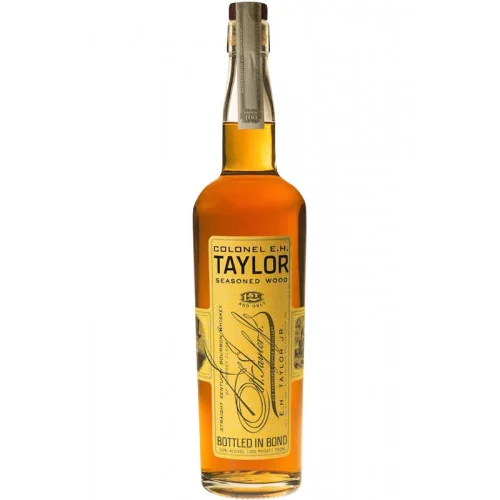About Colonel E.H. Taylor, Jr. Seasoned Wood Kentucky Straight Bourbon Whiskey
Colonel E.H. Taylor Jr Seasoned Wood .Colonel Edmund Haynes Taylor, Jr. was knownAbout Colonel E.H. Taylor, Jr. Seasoned Wood Kentucky Straight Bourbon Whiskey
Colonel E.H. Taylor Jr Seasoned Wood .Colonel Edmund Haynes Taylor, Jr. was known for consistently producing excellent whiskey in the 1800s and popularizing the sour mash technique. The Seasoned Oak is the first expression to be released in the E.H. Taylor, Jr lineup that features a wheated bourbon mash bill. It pays tribute to Taylor’s spirit of innovation with various innovative techniques: the whiskey was matured for more than a decade in new oak casks that were made from specially treated staves. The resulting whiskey is bright and citrusy with rich oak, fruit, and spice notes. It’s bottled at 100 proof.
Grab your bottle of this innovative bourbon today!
Colonel E.H. Taylor Jr Seasoned Wood
In 1869, Taylor purchased a small distillery situated on the banks of the Kentucky River. After christening the distillery O.F.C Distillery (OFC was an abbreviation for Old Fire Copper), Taylor began renovating and modernizing the plant — he purchased copper fermentation tanks, new grain grinding equipment, and unique, columnar stills. During his tenure, Taylor also implemented several innovative distilling techniques, including aging bourbon in climate-controlled rickhouses. Colonel E.H. Taylor Jr Seasoned Wood
At the time, an overwhelming number of distilleries were still not aging their whiskey. In order to make their spirits palatable, some distillers and retailers added juices and syrups to sweeten their bourbon. While others added acid and tobacco to give the whiskey its signature, amber hue.
Armed with distilling experience and a political pedigree, Taylor, together with Treasury Secretary John G. Carlisle, was instrumental in passing the Bottled-In-Bond Act of 1897 (27 C.F.R. 5.21). The act required that any spirit labeled as “Bonded” or “Bottled-in-Bond” be the product of one distiller at one distillery during one distillation season. In addition, the Act required that bonded spirits be aged in a federally bonded warehouse under U.S. government supervision for at least four years and bottled at 100 proof.




Reviews
There are no reviews yet.